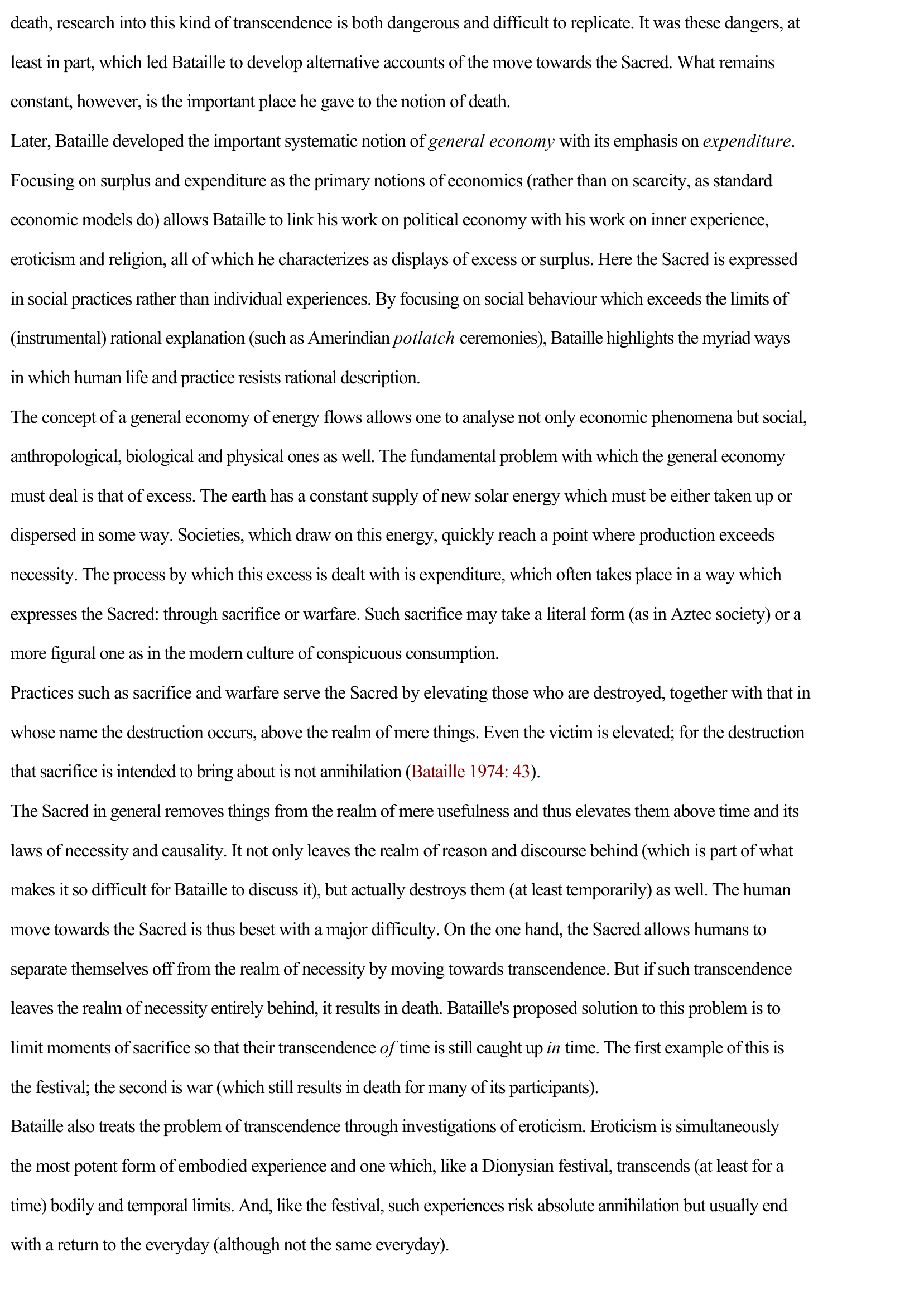Bataille, Georges
Publié le 22/02/2012
Extrait du document
«
death, research into this kind of transcendence is both dangerous and difficult to replicate.
It was these dangers, at
least in part, which led Bataille to develop alternative accounts of the move towards the Sacred.
What remains
constant, however, is the important place he gave to the notion of death.
Later, Bataille developed the important systematic notion of general economy with its emphasis on expenditure .
Focusing on surplus and expenditure as the primary notions of economics (rather than on scarcity, as standard
economic models do) allows Bataille to link his work on political economy with his work on inner experience,
eroticism and religion, all of which he characterizes as displays of excess or surplus.
Here the Sacred is expressed
in social practices rather than individual experiences.
By focusing on social behaviour which exceeds the limits of
(instrumental) rational explanation (such as Amerindian potlatch ceremonies), Bataille highlights the myriad ways
in which human life and practice resists rational description.
The concept of a general economy of energy flows allows one to analyse not only economic phenomena but social,
anthropological, biological and physical ones as well.
The fundamental problem with which the general economy
must deal is that of excess.
The earth has a constant supply of new solar energy which must be either taken up or
dispersed in some way.
Societies, which draw on this energy, quickly reach a point where production exceeds
necessity.
The process by which this excess is dealt with is expenditure, which often takes place in a way which
expresses the Sacred: through sacrifice or warfare.
Such sacrifice may take a literal form (as in Aztec society) or a
more figural one as in the modern culture of conspicuous consumption.
Practices such as sacrifice and warfare serve the Sacred by elevating those who are destroyed, together with that in
whose name the destruction occurs, above the realm of mere things.
Even the victim is elevated; for the destruction
that sacrifice is intended to bring about is not annihilation ( Bataille 1974: 43 ).
The Sacred in general removes things from the realm of mere usefulness and thus elevates them above time and its
laws of necessity and causality.
It not only leaves the realm of reason and discourse behind (which is part of what
makes it so difficult for Bataille to discuss it), but actually destroys them (at least temporarily) as well.
The human
move towards the Sacred is thus beset with a major difficulty.
On the one hand, the Sacred allows humans to
separate themselves off from the realm of necessity by moving towards transcendence.
But if such transcendence
leaves the realm of necessity entirely behind, it results in death.
Bataille's proposed solution to this problem is to
limit moments of sacrifice so that their transcendence of time is still caught up in time.
The first example of this is
the festival; the second is war (which still results in death for many of its participants).
Bataille also treats the problem of transcendence through investigations of eroticism.
Eroticism is simultaneously
the most potent form of embodied experience and one which, like a Dionysian festival, transcends (at least for a
time) bodily and temporal limits.
And, like the festival, such experiences risk absolute annihilation but usually end
with a return to the everyday (although not the same everyday)..
»
↓↓↓ APERÇU DU DOCUMENT ↓↓↓
Liens utiles
- ÉROTISME (l') de Georges Bataille
- HISTOIRE DE L’œIL de Georges Bataille (résumé et analyse de l'oeuvre)
- PART MAUDITE (LA), Essai d’économie générale, Georges Bataille - résumé de l'oeuvre
- BLEU DU CIEL (Le). Georges Bataille (résumé)
- ANUS SOLAIRE (L’) Georges Bataille (résumé)

































